For the first time in what feels like an eternity, the Los Angeles Kings actually have depth to talk about at forward. So much depth that some players need to be cut. With preseason kicking into full gear, the roster trimming will begin soon. The team will need to trade or send someone through waivers, at least two players before the season starts. With more players than roster spots, this has been an inevitability for a while now, and it will be interesting to see what direction the team goes in. I’m going to make a case for and against each of the fringe players who sit on the chopping block.
Who Makes the Kings?
Before looking at who doesn’t make the team, I want to look at who does. For today’s exercise, I will be making two assumptions. The first assumption is that Russian forward Vladimir Tkachev makes the team out of camp. Based on the first few days of training camp, there seems to be a genuine belief in him making the opening night roster, so I’m assuming he does just that. The second assumption is that none of the team’s prospects make the opening night roster. With a logjam already created at forward, I wouldn’t be surprised to see all but one waiver-eligible player (Jaret Anderson-Dolan) start the season in Ontario. With that in mind, here’s my rough prediction of the team’s roster and forward lines on opening night, based on the early days of preseason.
| Viktor Arvidsson | Anze Kopitar | Dustin Brown |
| Alex Iafallo | Phillip Danault | Vladimir Tkachev |
| Adrian Kempe | Gabriel Vilardi | Lias Andersson |
| Trevor Moore | Jaret Anderson-Dolan | RW4 |
| FW 13 | FW 14 |
This is a very rough estimate based on what I have seen during training camp, and this would leave three spots available for six players. The six players, not including prospects, who are fighting for these spots are Andreas Athanasiou, Carl Grundstrom, Martin Frk, Blake Lizotte, Austin Wagner, and Brendan Lemieux.
Andreas Athanasiou
The Case for Athanasiou
He scores goals. Last season, he tied Anze Kopitar for the team lead in 5-on-5 goals with 10. With only one of his 23 points coming on the power play, Athanasiou was one of the team’s more productive 5-on-5 players. The other big positive he brings to the lineup is his blazing speed. There are very few players in the entire NHL that can match his speed, and that’s a great asset to have on your team. Other teams are aware of this threat and are often forced to play more conservatively with him on the ice; his presence on the ice creates space for teammates. With what I’ve said here, he seems like an easy choice to make the team, but there are some issues.
You May Also Like:
- NHL Rumours: Thomas to Mammoth, Henrique Staying & Kings Forward Hunting
- NHL Morning Recap – March 1, 2026
- Back-to-Back Disasters Spark Concerns About Kings’ Playoff Hopes
- NHL Morning Recap – February 27, 2026
- NHL Morning Recap – February 26, 2026
The Case Against Athanasiou
The main issue with him is his inconsistency, as he’s a very streaky goal scorer who can go missing for long stretches. In fairness to him, that’s often true of all but the best goal scorers. But it’s still an issue — last season, six of his 10 goals came in the first 17 games of the season, meaning he found the net just four times in the remaining 29 games. This is a big concern when you factor in his inability to affect the game in other ways. He’s a subpar player defensively, is one of the least physical players on the team, and he isn’t a great playmaker.
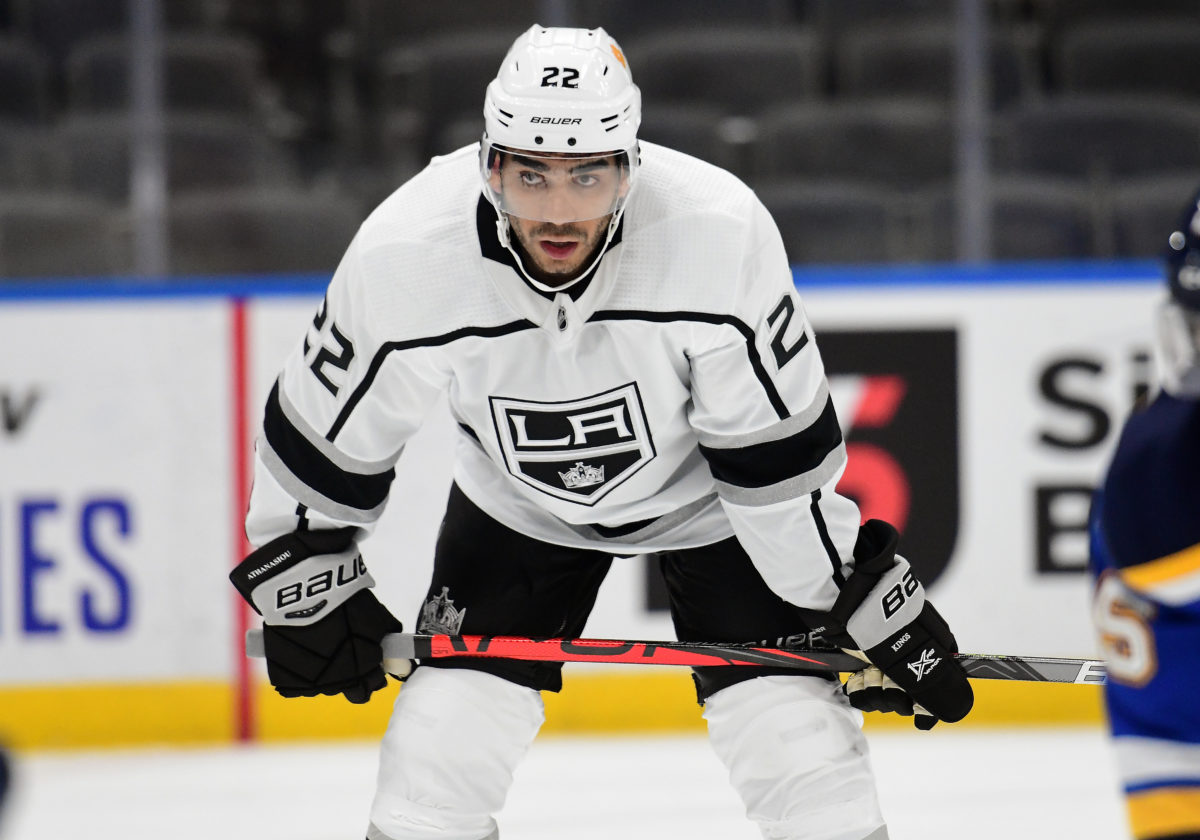
Considering he would likely find himself in a bottom-six role, his streaky goal-scoring and lack of effectiveness in all other areas might deter the Kings from keeping him on the roster. He isn’t the profile of player you want in your bottom six and isn’t good enough to make your top-six, meaning he could find himself off the roster. He is also unlikely to be content with filling the 13th or 14th forward spot, meaning you would need to be confident that he cracks the lineup consistently before choosing him over other players.
Carl Grundstrom
The Case for Grundstrom
I think the case from Grundstrom is in potential upside and his player profile. Still just 23 years old, there is room for growth in his game, as he was drafted as a physical power forward with goal-scoring upside. The physical side of his game is apparent, leading all Kings players in hits last season with 104. With the lineup I posted above lacking some physicality and grit, he could find a fit on the fourth line because of his physicality. I’m always wary of playing someone simply because they hit a lot, but I do think teams still need a physical presence in their lineup, and he can bring that. If the team is confident he can find some of the goal-scoring touch we’ve seen in the American Hockey League, he’s a no-brainer to bring on as a fourth-line winger. As a young player, he is also more likely to accept being scratched frequently compared to someone like Athanasiou.
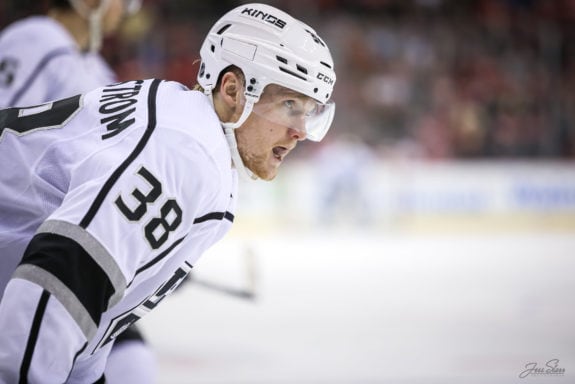
The Case Against Grundstrom
In the case for Grundstrom, I mentioned his potential upside as a goal-scoring power forward. The case against him would revolve around the fact that we’ve never seen the flashes of that player in the NHL. He’s only played one full season in the NHL, so the sample size is small, but the numbers are damning. When looking at his season statistically, both his raw numbers and his analytics are poor. He picked up just 11 points in 47 games and posted a -10 plus-minus. These aren’t terrible for a bottom-six player in isolation, but when you couple them with his analytics, it’s bad. His possession numbers are subpar, posting a 46.9% Corsi for percentage (CF%) and a 48.0% Fenwick for percentage (FF%). He was also a sub-replacement level forward, according to TopDownHockey’s wins above replacement (WAR) model.
Frankly, if he wasn’t a young player who has some potential, he wouldn’t even be considered for this spot posting those numbers. The numbers point to an ineffective player last season, and if you want to be harsh, you could consider him a liability. I will be fair to him and say, I don’t think the eye test matches these numbers. He wasn’t amazing last season, but I didn’t think he was a sub-replacement level player. He was impressive in the first few days of training camp as well. It will take a lot from him in the next few weeks to earn his spot, as he needs to convince coach Todd McLellan that last season isn’t his peak.
Martin Frk
The Case for Frk
I’ll start the section on Frk by saying that I really like this player and would love to see him get a second chance with LA. But I think there’s only one very specific scenario where I would bring him back. That scenario would be trying to rekindle his chemistry with Gabe Vilardi on the third line, and to a lesser extent, Adrian Kempe. During his impressive 2019-20 season for the Ontario Reign and with LA, it was his chemistry with Vilardi that stood out at both levels, and the Kempe-Vilardi-Frk line looked very good during their short stint together. After Vilardi struggled heavily through parts of last season, giving him a familiar player, who he has excelled playing with in the past, could be beneficial.
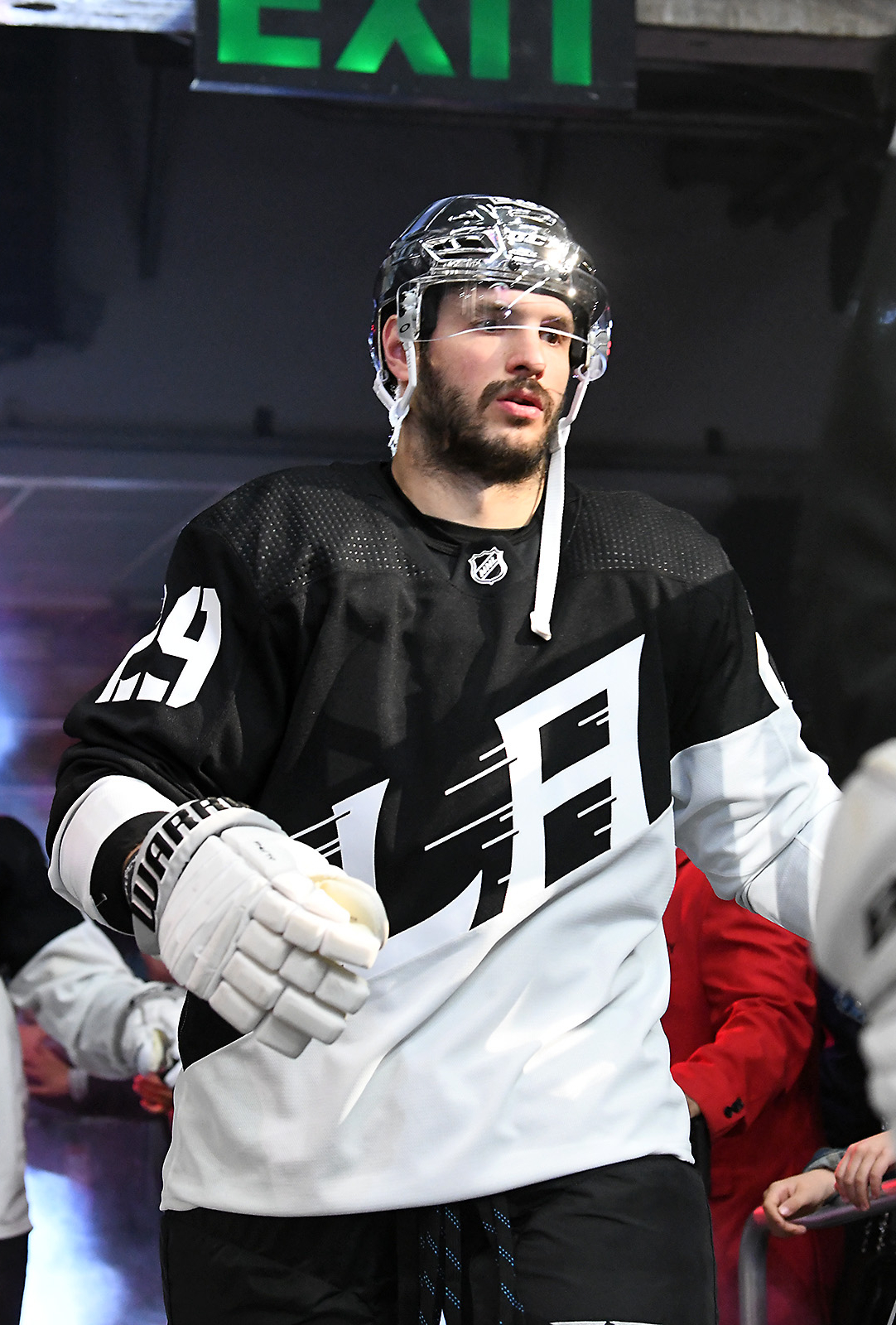
Outside of helping unlock some of Vilardi’s potential, there is some upside to playing Frk, mainly his goalscoring, as the Kings finished last season 27th in the league for goals scored, a dismal standing that must improve. Adding someone with his shot could certainly help that, and he could also provide some much-needed help to the team’s second power-play unit. Outside of his shot, he’s a physical player, averaging over one hit per game in his career. Again, hitting a lot is not enough to make this team alone, but physicality is something the team needs. It is worth noting that he was very impressive during the first few days of training camp.
The Case Against Frk
At nearly 28 years old, he has never stuck in the NHL, and that’s for a reason. He is poor defensively and offers very little offensively outside of his shot. He contributes very little to the team when he isn’t scoring goals and can even hurt the team with his tendency to get lost in his own zone or his tendency to outright abandoned his defensive duties in pursuit of odd-man rushes. As I said above, if you aren’t going to use him for the one specific reason I mentioned, rekindling chemistry with Vilardi, you probably don’t want him. Many people will believe that you shouldn’t keep Frk in the lineup over better players just to try and help Vilardi — that’s a more than fair point and one I’m sure the team’s coaching staff will consider.
Austin Wagner
The Case for Wagner
Wagner was a divisive player amongst the Kings fanbase last season, with several fans dreading the sight of him in the lineup over prospects. But there are positives to playing him, and these might keep him on the roster moving forward. Mainly, he is very fast and very physical. He was right behind Grundstrom with 97 hits last season and has been a physical presence in all three of his NHL seasons. Like Athanasiou, his speed is also a massive asset. Teams are aware of this threat now, and his speed keeps opposition defensemen from being too aggressive in fear of it. His speed and physicality make him an effective forechecker, and with the team possibly moving away from the 1-3-1, opting for a more aggressive forecheck, he could be very effective.
Wagner fits the mold for a fourth-line player in many respects, and this could see him keep his spot on the roster for the 2021-22 season.
The Case Against Wagner
Outside of his speed and physicality, he doesn’t do anything else well. He’s not a good finisher who doesn’t convert his breakaway chances and creates almost no offense outside of breakaways. There was some hype around his goal-scoring potential after 12 goals in his first season, but reality struck after that year. His unsustainable 17.9% shooting percentage (SH%) has come crashing down over the last two seasons, 4.8 percent and 6.0 percent, respectively. Considering he has never produced big numbers at any level, I think a big knock on him is his lack of potential, as he has peaked as a player and is unlikely to improve further. He can be an effective player, but he would be blocking someone with more potential upside — for many fans, that’s enough to see him not make the roster.
Brendan Lemieux
The Case for Lemieux
His willingness and ability to drop the gloves is really the only reason to bring Lemieux back this season. He is not particularly effective offensively or defensively at 5-on-5 and plays almost no time on the penalty kill or power play. His effectiveness lies solely in his ability to protect teammates. Fortunately for him, that’s still a somewhat necessary role in the league. While I’m not a huge subscriber of the need for “goons” in the modern NHL, the situation between the New York Rangers and Tom Wilson proved that there’s still a place in the league for guys that can stick up for their teammates. With Kurtis MacDermid leaving over the summer, the team might feel they need Lemieux to provide that protector role. He would also likely be willing to fill the 14th forward role, being scratched for a lot of games.
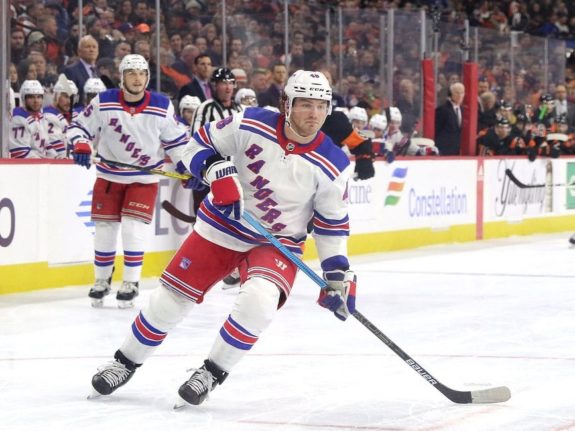
The Case Against Lemieux
He isn’t a particularly effective hockey player. As I mentioned above, he doesn’t bring a lot to the table in between whistles. He doesn’t generate offense and can’t help in shutting the opposition down. He would be used simply as a deterrent against other teams taking their liberties on LA’s more talented players or as a reaction to someone taking liberties. Even if he makes the roster, I can’t imagine he dresses for more than half of the games.
Blake Lizotte
The Case for Lizotte
Lizotte is a versatile center, who during his two full seasons with LA, has proven that he can fill a multitude of roles up the middle. He has played everywhere from second-line center to fourth-line center during his two years and has always given maximum effort while on the ice. He also showed potential playmaking upside during his first season, which completely vanished during his sophomore season. I think his biggest case to make the team is his position; he is the only player in this group who has spent significant time at center for LA, and that might give him an edge. If a Kings center went down with an injury, he would be a solid player to come in and fill any role.
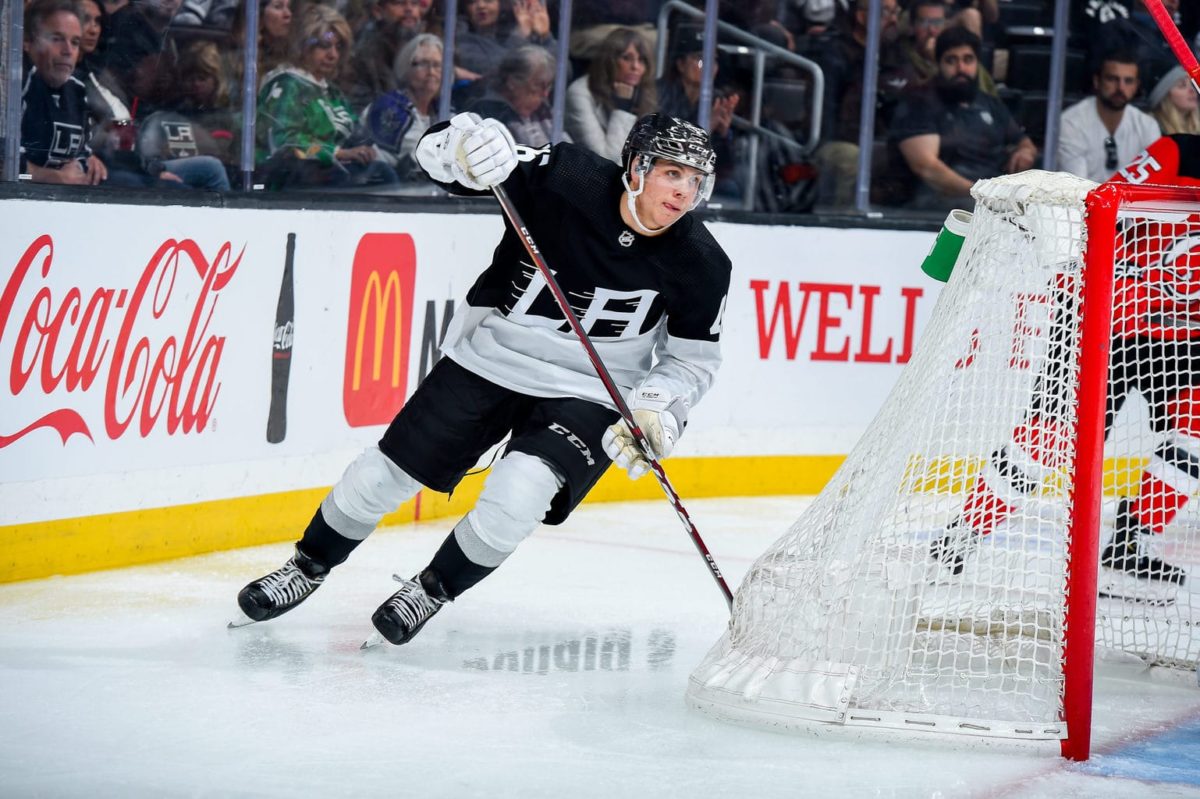
The Case Against Lizotte
Most of the above players excel in one area, and he does not. Lizotte is a decent at everything, great at nothing, kind of player. While some people would consider that a positive, I think his lack of blazing speed, physicality, or high-level shooting hurts him when comparing to other players on this list. He would bring stability to the bottom of this Kings lineup but wouldn’t bring anything special. Also, his position at center is both a positive and a negative. If management thinks some of the team’s young centers can handle short stints in the NHL, him being a center might cause him to be expendable.
Kings Have Good Options
Regardless of who LA picks to fill out their roster, their last three forward spots will be filled by solid players. Competition for spots is a good thing and might bring out the best in some of these players. I think Athanasiou, Grundstrom, and Lemieux will be the three forwards that stay on the roster, although I would love to see Frk get a chance with the team. I think Athanasiou’s 5-on-5 production keeps him on the roster, Grundstrom’s physicality and potential earn him a spot, and Lemieux gets a spot because the team doesn’t want to be without an enforcer. Of course, this can all change if Tkachev doesn’t make the team or a prospect forces their way onto the roster. But given what I have seen so far, this is my best guess at what the opening night roster will look like.